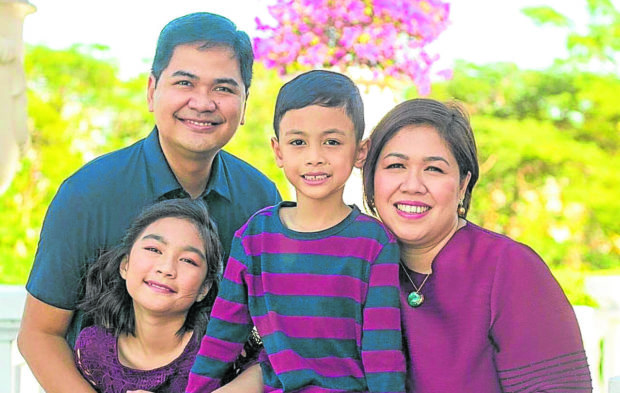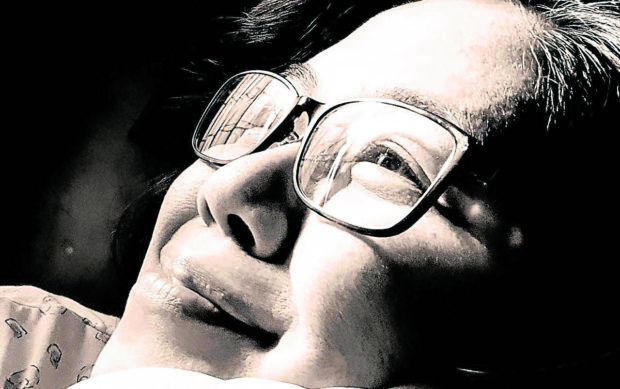Dr. Kharen Abat-Senen: ‘You have touched so many lives with your light’

BROUGHT TOGETHER BY MUSIC Dr. Jerome Senen said his wife Kharen filled their house with music and spent her free time recording and singing songs with their children. —PHOTOS FROM DR. JEROME SENEN
MANILA, Philippines — If Dr. Kathlynne “Kharen” Abat-Senen‘s family could pick a song to sum up her short but radiant life, it would be “Light of A Million Mornings.”
“She was one of the bright spots here in the world during a very bleak moment in our lives because of this pandemic. She even dedicated songs to our medical workers and pushed them to have hope amid these trying times,” said Jerome, her husband.
According to him, she also filled their house with music, spending whatever free time she had with their children singing and recording songs, or belting tunes in the car on the way to work.
But in June, the couple’s home was filled with silence. Senen’s versions of “The Warrior is A Child” and “Love Like You” gave way to frantic calls to distraught relatives.
As the lone neonatologist in Valenzuela City and the southern parts of Bulacan province, she often accepted urgent calls from patients in the wee hours of the morning even if it meant she would not be able to see her family for days.
Article continues after this advertisementWhen Senen tested positive for the new coronavirus disease (COVID-19) on June 10, she was immediately brought to a hospital where she was also diagnosed with mild pneumonia.
Article continues after this advertisementIn her 23-day confinement, she received convalescent plasma therapy to help her fight off the virus which disappeared by the beginning of July.
But two days after going home and trying to resume a normal life, Senen began experiencing severe symptoms and returned to the hospital, where she was again found positive for COVID-19.
“Kharen told me, ‘What are we going to do? I think we’re going to end up spending my birthday here.’ But I offered her words of encouragement and told her that maybe we wouldn’t even have to spend more than a week in the hospital,” Jerome told the Inquirer in a recent interview.
But his wife remained at the Philippine General Hospital’s intensive care unit for over a month due to the severity of her condition.
Her 43rd birthday on July 22 came and went without her being aware of it since she had to be sedated for her body to rest and absorb medication.
The irony was not lost on those closest to her since before the pandemic, she had spent her days planning birthday parties for her family of four, in which she would gather their relatives and closest friends and deliver heartfelt speeches.
“I will never forget the surprise party she threw for me on my 40th birthday last year because it was one of the happiest moments of my life. I am the type of person who wouldn’t ask for anything; even if I don’t celebrate my birthday with a party, I would be fine,” Jerome said.

LIGHT AND LOVE “She was one of the bright spots here in the world during a very bleak moment in our lives because of this pandemic,” Jerome said of Kharen.
But on his wife’s birthday, Jerome pleaded with the doctors and nurses to allow him to enter her isolation room for a few minutes. He had organized a Zoom party for her, with her loved ones reunited to send their greetings and well wishes for her recovery.
Jerome had even set up an mp3 player and a speaker inside her room that would play on loop her recorded songs and words of encouragement from friends and family, all hopeful she would again emerge victorious against the unseen but deadly enemy.
But on the morning of Aug. 23, Jerome stood by her bed, holding her cheek and reassuring her that while her battle with COVID-19 was coming to an end, her light would never be extinguished.
“You have touched so many lives with your light, and I will carry your torch in me. But I might not even hold a candle to you — not as bright as your light,” Jerome told her.
As pediatricians, the couple had taken care of other children, sometimes “to the detriment of our quality time with our own kids,” Jerome said.
This was why before his wife found herself infected with COVID-19, she had planned mini “staycations” in hotels, food trips with Jerome, or drawing and singing sessions with her two children.
While he had saved recordings of her singing her own renditions of various songs and photos of their time together, Jerome said these would never compare to hearing her sing in person or idly holding her hand in the car on their way to work.
But what he and their loved ones would never forget, according to him, was her dedication to their profession in the face of a pandemic.
“When COVID-19 cases began increasing in March, she told me, ‘If we don’t attend to our patients, who will? If we do not move now, when will we move?’” Jerome said.
“As a consultant, Kharen always taught doctors in training that the practice of medicine is not always about earning; it’s not a business. You should always show compassion,” he added.
For more news about the novel coronavirus click here.
What you need to know about Coronavirus.
For more information on COVID-19, call the DOH Hotline: (02) 86517800 local 1149/1150.
The Inquirer Foundation supports our healthcare frontliners and is still accepting cash donations to be deposited at Banco de Oro (BDO) current account #007960018860 or donate through PayMaya using this link.